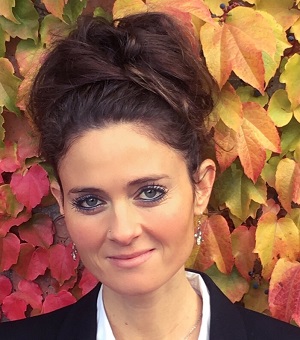Interview with Evelyn Otero Sola

Hello Evelyn, tell us a little bit about you, your academic background, where you come from, etc.?
I am originally from San Sebastian, Spain, but I have studied my entire life abroad, spending 20 years in France, 2 years in Germany and up to now 14 years in Sweden. Firstly, I obtained a Master of Engineering in Telecommunications, Information Technology and Network from the Higher National School ENSEIRB in Bordeaux, France, in 2006. Afterwards, I decided to further enrich my background with a scientific education and in 2009 I obtained a double Master of Science in Scientific Computing, with honours from Friedrich-Alexander-University-Erlangen, Germany, and from KTH, Sweden. My master’s thesis in computational fluid dynamics (CFD) applied to aeronautics led to my PhD studies in aerospace engineering in 2010 at my current department at KTH. My interest in aviation started to grow by then, and specially during my later experience in the aviation industry in the domain of air traffic management (ATM) and sustainable aviation, in Sweden. In 2016, I came back to KTH as a postdoctoral researcher, and in 2018 I was appointed as an assistant professor in aeronautical engineering giving me the opportunity to educate, develop and lead research in the earlier mentioned areas of interest within aviation. Since February I continue my work as an associate professor.
Tell us about your research; what makes it important?
My research corresponds to a new area of investigation at KTH and covers the area of sustainable aviation from a system perspective. In particular, my research aims to reduce emissions from aviation through operational measures within the air traffic management (ATM) system. This implies the analysis and optimization of aircraft trajectories to minimize not only CO2 emissions but also non-CO2 dependent on the atmosphere, considering interdependencies as well with respect to noise.
In addition to that, I am interested to position aviation in a higher system level comparing air travel to other transportation modes in terms of sustainability from a holistic perspective analysing the environmental, economic and social impact.
Finally, my plans are to also consider and integrate futuristic aircraft (e.g., hydrogen-powered and electric aircraft) and sustainable aviation fuels (SAF).
What made you interested in your field?
Attending for the first time, a seminar on flight trajectories optimization at the end of my PhD studies, strongly caught my interest. Seeing how fuel could be saved in real-case scenarios and therefore reducing gas emissions by just flying in a more optimal way, felt as a fascinating and relevant topic.
Later, as an assistant professor, my motivation quickly evolved with my growing awareness of the need for sustainability in aviation. In fact, when air travel is considered to be a transportation mode to be avoided or replaced, it is important not to forget and neglect all the technological efforts and progress which have been made in the aviation world since the last century. Therefore, with my research, I aim to support aviation into its next step of progress towards sustainability and thereby strive to save both the planet and aviation.
Is it important for you to communicate your research to the world? If yes, why and how do you do that?
It is definitely important for me to communicate my research as a mean to contribute to the acceleration and also quality of the integration of sustainability in aviation. For example, I regularly participate in international conferences, seminars, and workshops showing enthusiasm and making sure the presentations are enough clear and adapted to the audience. Moreover, last year I developed a new master’s level course in Aircraft Performance and Air Traffic Management (SD2830) directly linked to my research. Finally, my positions as Vice-Director of the KTH Centre for Sustainable Aviation (CSA) and internationally, representing KTH CSA as a member of the executive board of the Environmentally Compatible Air Transport System (ECATS) International Association, are also great opportunities to communicate my research.
What would be your message or advice to youngsters interested in pursuing scientific professions?
To find their motivations and interests, and to follow them in the best way possible with perseverance and patience, while being opened to interesting opportunities which may show up along the way.
Text: Elina Charatsidou
